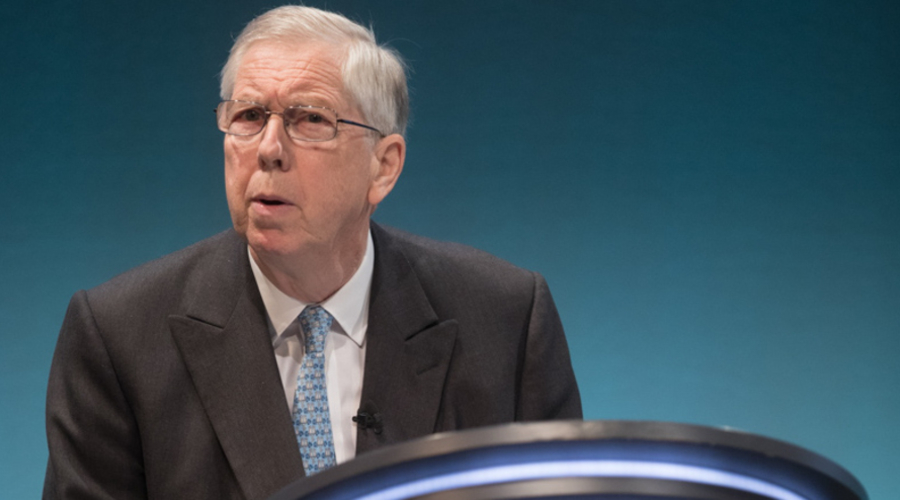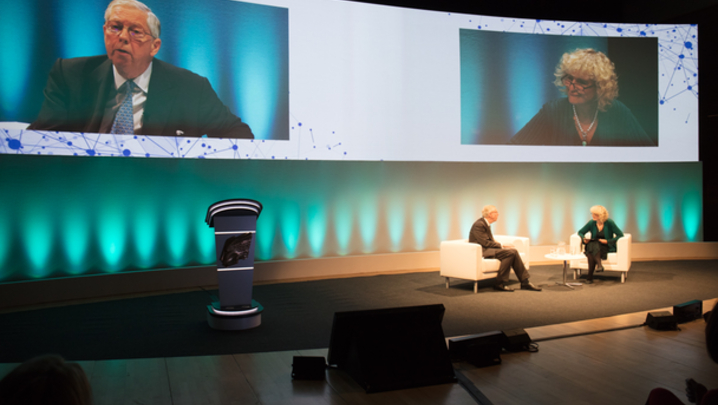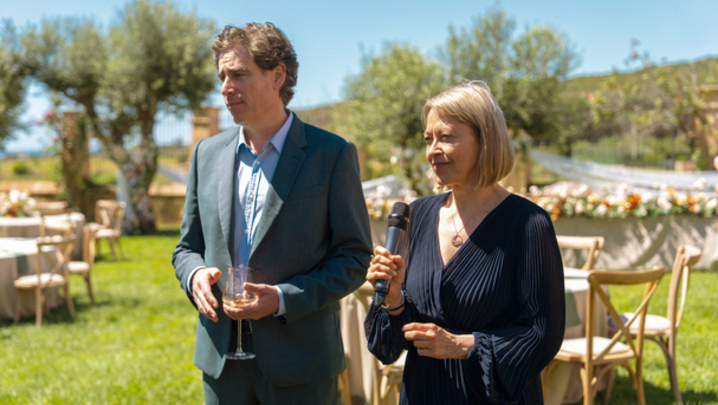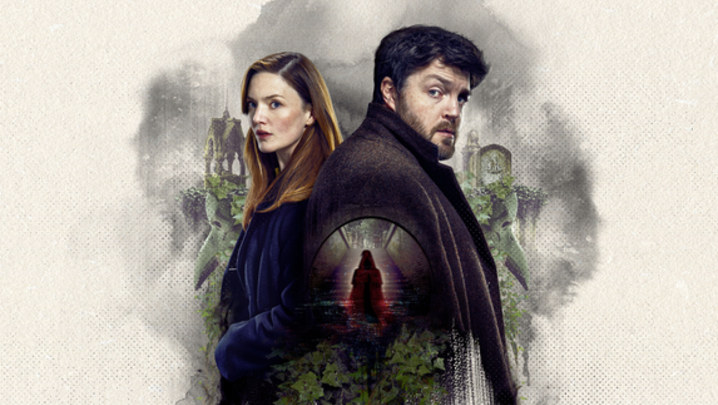Chairman of the BBC, Sir David Clementi, spoke to the RTS Cambridge Convention. You can read the live blog here.
Check against delivery
Introduction
I’m proud to be speaking to you as Chairman of the BBC.
A couple of years ago in his MacTaggart lecture, Armando Iannucci called public service broadcasting “one of the best things we’ve ever done” as a country.
It’s something I have always believed. And I believe the British public do as well.
Not just because an unprecedented number responded to the Government’s consultation paper at the time of our Charter Review, the great majority in support of the BBC…
…But also because the BBC always features right at the top of those lists that often appear in the papers of the things that make us feel most proud to be British.
I remember reading one of those not long ago. You know you occupy a special place in the nation’s heart when you’re right up there between Shakespeare and fish and chips…
But I also noticed that Doctor Who, Match of the Day, and The Promsall featured high in the top 50. As a Strictly fan, it’s surely only a matter of time before it joins the list!
Reading the list was a reminder – if one were needed – of just how embedded the BBC is in the fabric of our national life.
The challenge, of course, is how we build for the future, how we stay relevant, how we remain a source of pride to our audiences, in the face of changing times and changing technologies.
And that is something I want to focus on today.
Reinventing the BBC for a new generation
Throughout my life the BBC has been a constant presence, the constant lens through which important events can be watched and heard.
I belong to a generation that has always got a lot from the BBC.
It’s a generation that, for the most part, supports the BBC’s mission to inform, educate and entertain; appreciates the breadth of the services the BBC offers; and believes that £147 for one household for one year is good value.
But even though the BBC can bring the country together for big TV moments and national events, we know that all audiences – and particularly younger audiences – are increasingly consuming media in different ways and via an ever-growing number of platforms.
More and more, people are getting their TV and radio solely via the internet, and it’s happening more quickly than many think.
The competition for our audiences’ time and attention has never been greater, and the marketplace in which we operate has never been tougher.
That’s why Tony Hall has set the BBC a clear target for the years ahead: to reinvent public service broadcasting for a new generation.
The principle of universality remains right at our core… It means making sure that the BBC reaches everyone, wherever and however they want.
But if the market in which we operate is tougher and more crowded, in one respect, that of Governance, our job in reinventing the BBC has been made easier.
If you were confused about where responsibilities lay between the BBC Trust and the BBC Executive Board under the old Charter, you were not alone.
Thanks to the revised governance arrangements under the new Charter, we now have one unitary board.
It allows the BBC to speak, perhaps for the first time, with a single voice. And to get behind one clear strategy, with accountability for the BBC resting unambiguously in one set of hands.
I am very clear that the fundamental responsibility of the Board is to uphold and protect the independence of the BBC. History has shown us how important – and challenging – that can sometimes be.
We are also responsible for acting in the public interest; and for meeting the five public purposes that are set out in our new Charter.
Some may perceive these public purposes to be obligations imposed on us; a burden, if you like.
I view them quite differently. I think we should be proud of them. It is these five public purposes that set us apart from other broadcasters and underline that we have a distinctive role to play.
They represent our contract with the public. And because they are central to the way the new Board thinks about its responsibilities, I want to touch on each of them in turn, and say a little about how the Board plans to ensure that the BBC delivers them in the years ahead.
1. Impartial news and information
Upholding our first Public Purpose – to provide impartial, accurate news and information – is right at the heart of the BBC.
The value of our role as the most trusted source of news, both in this country and around the world, has not diminished in the internet age. In fact, it’s grown.
We live at a time when trust in the mainstream media has fallen significantly.
Truth and accuracy are under assault like never before. False claims travel the globe in an instant. And new media channels can speak, unchallenged, to closed groups of audiences.
The democratisation of the media has led both to the flourishing of free expression and an explosion of misinformation.
This is something that I’m sure James Harding, our Director for News and Current Affairs, will touch on in his panel tomorrow morning…
…But I believe that the BBC’s historic role as a trusted guide, the place people come when they want to find out what is really happening at home and around the world, has never been more vital.
We all need a place that we can always visit to cut through the noise and find the facts.
That is one of the reasons we have been investing in our global fact-checking operation: Reality Check.
We have now made it a permanent fixture in the battle against false information and fake news, with a dedicated team fact-checking the biggest or most shared stories.
But today we recognise it is not enough to wait for audiences to come to us. We need to make sure we go to them, wherever they are.
Take voice-controlled interfaces as an example.
As they gain in popularity, I’m pleased to report that BBC News is now the default choice when UK users ask for the news on Google Home or Amazon’s Alexa devices.
We need to reach people with BBC news wherever they are, if we are to lift people out of their "echo chamber".
In an environment in which it is becoming all too easy to choose services that only provide news which reinforces our own opinions, part of the BBC’s job is to work even harder to promote understanding of alternative points of view.
And it is no surprise that alternative or contrary views expressed on the BBC may well grate to a larger extent than they once did.
Questions about Government policies, which seem to some parts of our audience natural questions to ask, are regarded by others as impertinent and disrespectful.
But holding those in power – or seeking power – to account, asking them what soundbites actually mean, is a key part of our job.
It is the responsibility of our journalists to ask the question – even if it is direct, awkward or unwelcome.
I have enormous respect for all journalists, not just BBC journalists, who do this day-in, day-out.
This brings me to an issue that has concerned me since I became Chairman of the BBC.
Speaking to our journalists, I have become increasingly aware of the abuse that some of them – particularly female journalists – are subject to, on an almost daily basis.
I am pleased that the Committee on Standards in Public Life is conducting a review into the intimidation of MPs.
This is extremely important; our elected officials should be able to carry out their duties without fearing for their safety.
But we must also support our journalists and call out the abuse they are receiving.
These days, there is much more abuse. It is increasingly explicit and aggressive. And much of it occurs online.
I welcome the work the Government is doing to tackle this, and I’m following closely the efforts of Twitter and Facebook, amongst others, to clamp down on the perpetrators. I hope the social media platforms do even more.
But some of it also occurs in plain sight, at press conferences and political gatherings on all sides. Politicians cannot stand by and watch – they must confront any abuse, and make it clear that it is intolerable.
The journalists of the BBC, when abused simply for doing their job, should know they have the determined support of the Board to stamp it out.
2. Learning for all ages
The second public purpose is to support learning for people of all ages.
It is an area which has been enhanced under our new Charter, although I hope this audience recognises that the BBC already does a great deal, not least via our programming.
One of the BBC’s biggest strengths is its ability to make programmes that can inform, educate, and entertain all at the same time.
Planet Earth II, for example, was the most requested programme on iPlayer last year, and ended up topping the Sunday night ratings, with more 16-34-year-olds watching than watched The X-Factor.
I also wanted to highlight two fantastic seasons that have been running over the summer.
Our Gay Britannia season, marking 50 years since the decriminalisation legislation of 1967, has reminded audiences of important changes in our society…
…And I have personally learnt much from the BBC’s series of TV and radio programmes marking 70 years since the independence and partition of India – programmes that we know have been really appreciated by our audiences.
But of course formal learning is also a major focus of our education mission.
BBC Bitesize is already used by approaching half of primary school students each term, and an incredible 80 per cent of those in secondary school – more than half of whom say it has helped them achieve better grades.
The goal is that a more personalised Bitesize will provide every child in the UK with tailored and targeted learning to help bring out their very best.
And just as the BBC Micro helped to inspire today’s generation of tech leaders, the micro:bit device that we have given to every 11-12 year old in the country is helping a new generation to learn the basic principles of coding.
There are areas, however, in which we need to do more to fulfil our mission; gaps we need to fill.
Doing more to support literacy for pre-school children, for example, or lifelong learning for adults.
I would like to see the BBC do more in these areas, and I expect us to announce more later in the year.
3. Creativity, quality and distinctiveness
Our third public purpose is to make the most creative, high-quality and distinctive output.
I thought about this as I watched a BBC drama that was broadcast in May and which I thought was outstanding: Three Girls.
It’s one of the programmes that, since I arrived at the BBC, I think best exemplifies our commitment to quality and distinctiveness; to making great drama, and telling important stories that might not otherwise be heard.
It was a bold piece, broadcast across three consecutive days, and sparked a considerable national debate.
I believe that only the BBC could have brought a drama on such a challenging subject to an average audience of over 8 million…
…And nearly 20 per cent of viewers were aged 16-34, showing that audiences of all ages value the BBC’s quality and risk-taking.
I’m proud that Three Girls was made by BBC Studios. And I believe Studios is going to be fundamental to fulfilling our third public purpose in the years ahead.
It represents the best way for us to create and own intellectual property in an increasingly competitive environment, and the means by which we will maintain our status, not just as a world-class broadcaster, but as one of the very best programme makers in the world.
It will therefore come as no surprise to you that ensuring BBC Studios is a success is one of the key objectives that the Board has set itself.
Under the new Charter, Studios is free to compete directly with other production companies, including seeking commissions from other broadcasters.
It was an inherent part of this Charter arrangement that the competition should proceed on as level a playing field as possible, with Studios not being subsidised by the public service activities of the BBC; and for existing BBC Studios commissions to be open to a contestability regime.
As part of the level playing field, it was agreed that Studios – like other production companies – would not be required to disclose the pay of those who worked for it.
So this exemption is not – as some have described it – an inadvertent loophole… It is an integral part of the competition arrangements and, so far as the BBC Board is concerned, is an important point of principle.
And, whilst I am on the third public purpose and the subject of distinctiveness, I would like to make one further comment about how we achieve it.
We have started to build a strong professional relationship with Ofcom, built around respect for each other's duties. I look forward to the final operating licence being published, which is an important part of how the BBC is held to account.
My observation, based on experience from other regulated industries, is that box ticking is the enemy of creative thinking, and in general of good consumer outcomes.
Attention is paid to meeting the specific requirements of the individual box, not to the sum of the parts, or to the overarching principles that determine strong consumer outcomes.
Turning to the broadcasting industry, the challenge is to strike the right balance between being held to account whilst having creative freedom to take risks, pursue original ideas and achieve distinctiveness.
In principle, we should want a broadcaster's performance to be judged by assessing outcomes and impacts for audiences, rather than by prescribing inputs.
And this is not a plea from me for doing away with our quota system; I recognise that in large part it is appropriate to the BBC with our privileged funding model and public obligations.
Nor should it be seen in any way as a wish to reduce these obligations… Quite the reverse, I hope the focus of this speech demonstrates the strength of my commitment to ensure the BBC meets them even better.
However, it is a plea from me to make sure that we get the balance right between accountability and enabling creativity. In particular, I am concerned about quotas that relate to hours of broadcasting, since the driver here is around quantity not quality.
A Charter which places distinctiveness at its heart, and then backs it up with a licence full of hourly quotas, is a contradiction that is likely to lead to failure.
Quotas relating to resource, and in particular to financial spend, are likely to be better drivers towards distinctiveness, although even they can never be guarantors of desired outcomes.
The Board will keep a close eye on how the operating licence works in practice to ensure that the BBC maintains creativity and distinctiveness at the heart of what we do.
4. Diversity, Nations and Regions
Our fourth public purpose is to reflect, represent and serve the diverse communities of all of the UK’s nations and regions.
We know how important it is that our audiences see themselves, their lives, and their communities reflected on their screens and on air.
Earlier this year, the BBC announced its biggest investment in Scotland, Wales, and Northern Ireland for decades. And in the Annual Plan we published in July, we set out our creative plans for all three.
We already make more programmes outside London – both in absolute terms and as a percentage of total output – and broadcast more local and nations output, than any other broadcaster.
But this new investment will help us rise to the challenge of better reflecting and representing a changing UK.
Later this year, we will also present plans for enhancing our local radio services – celebrating their 50th anniversary.
But, when it comes to making sure we reflect and serve all our audiences, diversity in our workforce is a major priority. And here we have made good progress.
Already, the BBC is one of the most diverse workforces in the UK: more diverse, I believe, than the civil service, and any FTSE100 company that reports its figures.
The targets we have set ourselves to reach by 2020 are among the most ambitious and stretching of any organisation, and we are making significant headway.
But we are acutely aware that there is much more to do. Not least on gender.
This has been much discussed in recent months, and will continue to be discussed as every UK organisation with more than 250 staff prepares to disclose its gender pay gap before April 2018.
We are confident that, when we publish our own gap in the next few weeks, we will prove to be significantly ahead of the national average. But we also know that the BBC should be the standard bearer, and we are determined to lead the way.
That’s why the Director General has committed to closing the gender pay gap, and ensuring an equal split of men and women in all presenting and lead roles.
He has also set out what we are doing to identify any issues of fairness and tackle them straight away.
Being at the vanguard on every aspect of diversity is fundamental to our mission of representing the whole of the UK, and all of its voices.
5. The UK to the world
The fifth and final public purpose is to reflect the UK, its culture and values to the world.
This has always been a vitally important part of our role. But arguably it is more important than ever at a moment when Britain is seeking to redefine its international identity and reshape its relationship with the world – in trade and investment, in cultural impact and soft power.
The World Service has long been central to the BBC's activities here, broadcasting to around 270 million people in 29 languages.
It is an extraordinary achievement: one of the UK’s greatest exports and the voice of Britain’s cultural wealth and democratic values worldwide.
Since 2014 the cost has been met from the licence fee. And over the next Charter period this will largely continue.
But the Government, recognising the importance of the World Service to the UK, has now made additional investment funds available.
It adds up to the biggest expansion of the World Service since the 1940s. It began last month, and will allow us to deliver services in 12 new languages, and enhance our output in the Middle East, Africa and Russia.
This will make a major contribution to the BBC’s goal of reaching half a billion people across the world by 2022, our centenary year.
I have to say, it is moving when one meets people from overseas who explain how important the BBC World Service is to them: when they explain how they cannot rely on local news services to inform them with any accuracy of what is going on in their own country, or what is going on in other parts of the world.
We take it for granted that we can switch on the TV or radio to get a realistic picture of national and international events.
But hundreds of millions across the globe rely on the BBC for this.
Even then they may need to find ways of circumventing the 'jamming' arrangements put in place by governments to block access.
Today in Iran, for example, from a total BBC audience of around 12 and a half million people, there are around one and a half million who rely on secure access to news from the BBC’s Persian service via instant messaging apps.
Iran is an example of how the difficult and challenging circumstances in which many of our World Service staff work, are frequently made even more challenging by the actions taken by foreign governments.
Worryingly, the Iranian courts have in recent weeks stepped up their Government’s harassment of Persian Service staff based in the UK, by freezing the assets they still hold in Iran… We call on this harassment to stop.
In many of these countries the notion of political impartiality has little meaning: there is only one ruling party and no official opposition.
But the concept of accuracy remains deeply important; and the independence of the BBC is the vital ingredient that gives the service the reputation it has.
Conclusion
As Chairman, I recognise the scale of responsibility that sits with me and the Board to deliver the BBC’s strategy, represent the public interest, and in doing so be accountable for how the licence fee is spent.
I began by asking how the BBC can safeguard its relevance in the years ahead… How we can ensure that our audiences continue to choose us even in the face of remarkable change.
The answer lies in successfully defending the BBC’s independence and in meeting – often in new and innovative ways – the five public purposes I have highlighted today.
If we can achieve this – and I believe we can – we will ensure that the BBC remains at the core of British life, and stays, along with fish and chips, at the top of those “great British” lists well into our second century.










